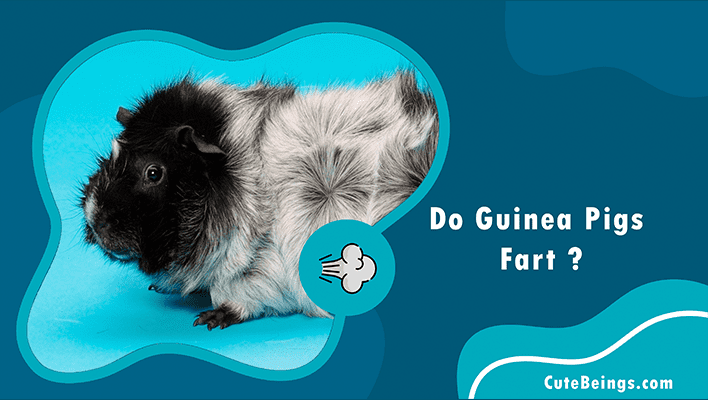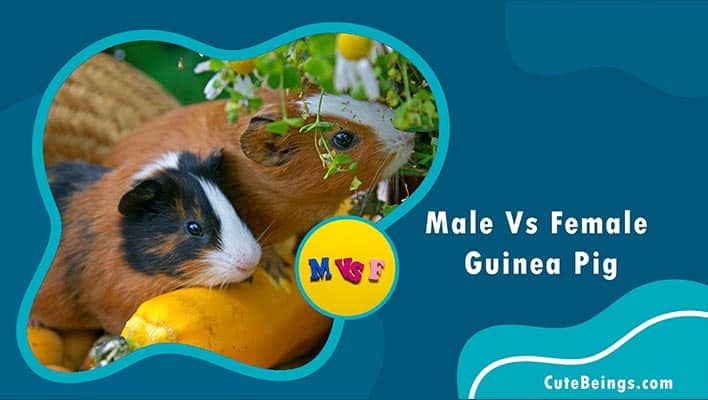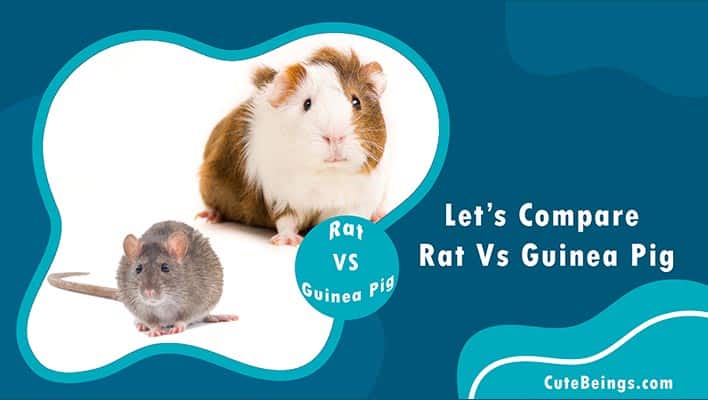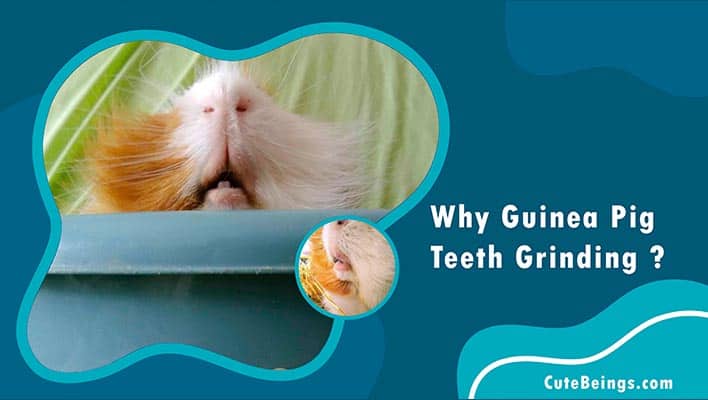Guinea pigs tend to make several noises such as squeaks, grunts and gnawing sounds. Apart from these you might have noticed a different sound with a smell that you didn’t expect to hear from your guinea pig which makes you think do guinea pigs fart?
You might not be sure whether your guinea pig farted when you hear the sound and you might be worrying about your pet’s health wondering there is something wrong with your guinea pig.
Table of Contents
Do Guinea Pigs Fart?
The answer is yes, guinea pigs fart and it smells bad when they do it.
This is a normal phenomenon and natural thing but too much gas can be dangerous to your pet. Guinea pigs’ digestive system is generally similar to human digestive system and usually guinea pigs are not able to pass larger quantity of gas. Too much gas can cause a life threatening health issue called “guinea pig bloat”.
Most of our domestic pets such as dog and cat may fart and with guinea pigs, let’s find out what causes it and things to do if it becomes a health issue to your piggy.
Farting
In small intestines, initial digestion starts and blood vessels are capable of absorbing all the essential nutrients at this stage. Next, the food is reaching caecum and any remnant nutrients will be absorbed. Then food moves towards the large intestine to begin fermentation.
This fermentation process generates intestinal gas and this gas is passed to the colon from the caecum. Humans usually pass this gas but in guinea pigs these gases tend to stay in the colon as it is not able to move forward. Anyhow guinea pigs are unable to pass the gas as humans do.
The Correlation Between Bloating And Gas
Each mammal usually has intestinal gas to a certain amount which is produced during digestion. In intestines the extreme gas increases. When mammals consume foods, the digestive juices come into action and gases are developed. When consuming foods, air is also ingested and sacks of air are trapped in the foods as mammals chew on them. As a result of this air ends up in their little stomachs.
This gas combines with the gas which is already produced during the digestion and it becomes large quantity of gas inside the stomach. If there is no way to force out the gas it can quickly turn into a great problem which can risk your pet’s life.
As I mentioned earlier guinea pigs are unable to pass the intestinal gases as they wish, so the excess gases could easily cause bloating which is very painful to your guinea pig and further it could be a fatal situation to your pet. Intestinal gases play a main role in guinea pigs to suffer from bloating.
When a guinea pig is suffering from bloating, its belly would become bloated and would lead to a gut-wrenching pain. Intestinal twisting is another cause of this and it’s way too dangerous. Intestinal twisting happens when intestines twist which further cause intestinal blockage. This condition is very critical and usual digestion process can be disrupted.
If your guinea pig is suffering from intestinal twisting, you need to treat it as soon as possible otherwise it could be fatal to your pig. Viruses, bacteria, parasites and hairball impaction could be the triggers to this condition. According to some researches excess gas and certain food can produce this condition. You need to observe your guinea pig closely for any unusual changes. If your pet passes an occasional fart rarely, there is nothing to worry but if your piggy farts few times a day it’s time to seek medical advice.
The discomfort in guinea pigs is very painful as bloating arises. When organs are compressed due to excess gas, guinea pig bloat would take place. As a result of bloating gut motility will be severely slowed. This is fatal condition to your pet if not treated in time.
In overall, bloating can be considered as an ordinary problem in guinea pigs that avoids food from shifting through the gastrointestinal tract which could be a harsh state. It is called GI stasis and it would lead to a visibly bloated stomach.
Symptoms of Guinea Pig Bloating
-
Distended and puffed-up belly
You can notice a swelling around your guinea pig’s stomach and this will clearly notify you that your piggy is bloated.
-
Loss or decreased appetite
When bloating occurs you will notice that your pig is not consuming the same amount as it used to do and in some cases some guinea pigs will not eat at all.
-
Lethargy, weakness and muscles spasms
Guinea pig will not move much and would refuse to play with you. Further it will lie down or rest in the corner of the cage.
-
Fast breathing
After bowel movements, breathing of your pig should be normal. If your guinea pig takes a great effort to breathe, it’s time to seek medical advice immediately.
-
Makes a lot of noises
This could be a sign that your pet is trying to say its pain. Sometimes your pet may whine when you touch him because of its distended, sore stomach. If you believe guinea pig bloat, you need to take your pet to your vet as soon as possible.
- Weight loss
- Restless movements
- Regurgitation of saliva due to nausea
- Constipation
- Aggressive behavior
- When your pet doesn’t poop for 24 hours
Causes Of Bloating
Gas is produced in digestive process and it’s normal but the trouble begins when ordinary digestion is disturbed. Look out for these causes of excessive gas in guinea pigs.
- Food
Food is the number one in the list of bloating causes. An unsuitable diet can definitely cause gas in your pet. Usually a high sugar diet or a high carbohydrates diet can easily cause gas in guinea pigs.
- Sudden changes in guinea pig’s diet
The main things in a good guinea pig diet are balance and reliability. Due these facts sudden changes in diet can cause disorders in guinea pigs’ sensitive digestive system. When you change your pet’s food, its digestive system would take weeks to get use to it. This new food will surely cause gas in your pet.
-
Surplus of fermentable vegetables
Cabbage family vegetables such as Brussels sprouts, kale, cauliflower, red cabbage, white cabbage and too much fresh herbs and sweet fruits can cause gas in guinea pigs.
-
Wet, cold or rotten foods
Water and food must be in good condition to consume to prevent the risk of fermentation.
-
Too much food intake
Excessive food intake can produce gas and further it could lead to farting.
-
Dehydration
Your pet’s intestines could become dry if it doesn’t drink enough water.
-
Quick ingestion of food
Sometimes greedy guinea pigs tend to eat quickly. When they are doing that they swallow air with food which cannot be passed later. This occurs when your guinea pig eats too much or from the foods which cause flatulence.
-
Stress
Stress can be the reason for many diseases. Stress could stimulate the contractions of the intestine and that could lead to bloating. Thyroid gland can be directly affected by any sort of emotional stress. This emotional stress would accelerate the activity of the thyroid gland and that will produce gas ergo as a result of over stress.
- Antibiotics
If your furry babies are taking antibiotics guinea pigs fart is an ordinary side effect. Good bacteria in guinea pigs’ gut are destroyed by the antibiotics. Further this could result loose stools and gas for several days.
This problem can last till their body gains the balance of bacteria levels. If you are providing antibiotics to guinea pig, it’s better if you can provide a probiotic such as Benebac so the good gut bacteria can be built to help with the farts and digestion.
- Dairy products
As well as for humans guinea pigs find it hard to digest dairy products. As you might aware a young cavy relies on mother’s milk but as it age dairy products can cause digestive issues in them.
Important: you don’t need to worry if your cavy’s belly makes some kind of noises as it can be a sign of current digestive process.
What To Do When Your Guinea Pig Is Bloated?
There are few ways that you can help with your guinea pig’s bloating issue. Massaging your pet’s abdomen area is one of them. You can do it by keeping your cavy on your lap, facing towards you and giving a gently massage to its belly from back to front so the gas could get out through its mouth.
Preventing Guinea Pig Bloating
Food alternatives
Guinea pig’s diet should contain high quality hay at least 70% from the whole diet. It’s not exciting to your pet though but adding snacks and fresh foods will cheer him up and provide essential nutrients.
Try following food options which your guinea pig would love to have and the best thing is these snacks would provide the fun of a snack while keeping him away from gas.
- Cucumbers
- Zucchini
- Carrots
- Yellow squash
Though these are great snacks, you should be careful about the quantity when you feed them. Leafy greens are good for snacks and guinea pigs are able to break down these foods easily as they enjoy the freshness of them.
Try to follow these points in order to prevent your pet guinea pig developing a bloating.
- Make your pet to consume food slowly.
- When you introduce new food do it gradually.
- When feeding just offer the appropriate foods which are easy to digest.
- Offer enough fiber rich foods and that could flush out from the system and further they would prevent bloating gas.
- Do not feed guinea pig pellets that include corn or cereals as they are difficult to break down and in the long run, it could be harmful to your guinea pig’s health.
- Offer enough good quality hay to maintain a healthy digestive system. As it suppose to play the vital role in the diet, hay will help to control flatulence while keeping all the nutrients passing through their digestive system at a stable pace.
- You might already feed grass to your pet guinea pig. Grass clippings should not be fed to your pet as it can cause excessive gas. The other thing is these grass clippings can be a deadly combination of hazardous plants. Pet owners find their pets having expanded bellies after eating grass.
- Make your guinea pig exercise in a guinea pig playpen such as a playpen from Kavee or in a safe room. If possible, always try to give larger space in guinea pig cage. An active cavy would always be healthy and happy.
- Guinea pigs are terrible in handling stress and there could be many factors that could trigger stress in them. Always provide great care, love and support and try to fulfill their lives with good experiences.
- Offer clean water always as it plays a vital part in preventing gas formation. Water also maintains the electrolyte balance in the guinea pig’s body.
- You can offer gripe water to your pet. Usually gripe water is given to babies as a treatment to gas buildup. These water treatments should be given with a gentle massage to the pig’s belly area. Repeating this procedure 2 to 3 times across few hours should ease the bloat in guinea pig.
- Some foods are known to cause gas in guinea pig’s belly but still you can offer them to your guinea pig in reduced amounts. Look out for these foods that can cause bloating in your pet.
-
Collard greens
-
Peppers
-
Broccoli
-
Cauliflower
-
Cabbage
-
Bok choy
-
Potato
-
Radicchio
-
Dairy products and beans
-
Fresh grass
You might wonder to see broccoli and cabbage in this list and as a guinea pig owner you might already be feeding these foods to your cavy. Even cabbage and broccoli contain higher amounts of fiber, sometimes guinea pigs find it hard to digest them. You can offer these foods occasionally but not in large serving sizes.
Medical Treatments For Bloating
Invasive and non invasive methods are used when treating bloat and gas.
Invasive methods
This is very rare and includes surgery. Bloating can repeat several times in lifetime. Bloat can be treated with medicines but prognoses are hard to determine. Once this happens, vets can treat the situation but there is no guarantee that bloats will never return. According to the researches only 20% of guinea pigs would suffer from this condition.
Non invasive procedures
Non invasive methods include anti gas medication in combination with antibiotics to restore the ordinary intestinal function. Depending on the situation some veterinarians prescribe either anti gas medications or the antibiotics. As bloated belly is painful, pain medications are prescribed more often.
Medications such as meloxicam and carprofen are given to get a relief from pain and it is very important in curing GI stasis. Drugs such as cisapride and metoclopramide help in emptying the intestine elevating intestinally, stomach motility and gastric movements.
Antibiotics should be given to prevent the bacterial growth.
Frequently Asked Questions (FAQ)
What If Your Guinea Pig Doesn’t Fart At All?
Farting is a natural thing and it helps promoting the elimination of excess gas from the intestines and health. As mentioned earlier not farting can be a serious condition as intestine twisting or “Volvulus” prevents gas from leaving the abdomen. If the intestines are twisted, there is no way to pass the gas from belly. Take your pet to vet immediately and your pet will be prescribed with anti gas medications and antibiotics.
Should You Be Worried When Your Guinea Pig Farts?
Most of the time you don’t need to worry when your pet farts. Farting lets you pet to eliminate the excess gas from intestines and it can be really healthy. You need to be concerned when farting more often with a bloating belly. Observe its behavior and look for any changes so it will help you to identify the cause of farting quickly.
Do Guinea Pigs Pass Gas?
Naturally they are not able to pass gas. Every mammal has intestinal gas to some extent which is a byproduct of digestion. This usually causes painful and potentially lethal gas buildup which further leads to guinea pig bloat.
Do Guinea Pigs Farts Smell?
Mostly all farts can smell. This is due the stinky gases which are produced in the process of digestion. Traces of fundamentals like Sulphur are ordinary in farts and this normally carries the smell of eggs.
Everyone knows this regarding about humans but same applies for all the mammals. If we get on to guinea pig’s level, we can smell the guinea pig fart but luckily guinea pigs are small and we hardly feel any smell.
If the smell is very strong, frequent or not ordinary, it could be sign of a major issue. In such situation you will clearly notice it. If they happen to create unusual stinky farts you need to seek medical advice for your pet. This might be followed by diarrhea and excessive bloating so observe your pet closely in such situations.
Final Thoughts
If somebody asks “do guinea pigs fart?” the simple answer is yes and it’s quite normal as it happens occasionally. A little bit of guinea pig gas is ordinary but if your pet guinea pig is passing gas frequently or suffers from excessive farting that is something you need to worry about.

Hello, my name is James and I’ve been caring for tiny pets for over 14 years with a passion. I enjoy passing on my expertise to other individuals in order for them to have the same amount of enjoyment as I do.




